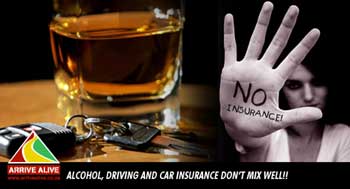Drunk driving should be more than an insurance concern!!
 Drivers should be more focused on responsible driving that merely avoiding arrest and time in jail! A recent email sent to the Arrive Alive website reveals how we are very concerned about our rights once caught driving drunk/ impaired…and perhaps too little concerned about remaining sober or having designated drivers taking us home!!
Drivers should be more focused on responsible driving that merely avoiding arrest and time in jail! A recent email sent to the Arrive Alive website reveals how we are very concerned about our rights once caught driving drunk/ impaired…and perhaps too little concerned about remaining sober or having designated drivers taking us home!!
We ask how much is too much before testing over the limit, and enquire about the consequences pertaining to car insurance – but neglect to emphasize the need for self-enforcement and driver responsibility!!
We would like to share the email and response from our experts:
Subject: Rights if caught for drunk driving
Message:
——–
Hi
I recently had a breathalyzer test at a road block in JHB, luckily I tested negative, but would still like to find out what are my rights in such a situation:
1) What is the breath alcohol limit? On you website I read 0.24mg/l but the officer informed me that it is 0.024?
2) Is there a number one can phone in order to determine if this is a lawful roadblock and not some policemen trying people out for bribes?
Assuming one is over the limit:
3) What is to happen next to you? Do you have to go for a blood test, can you just get fined and let someone come and pick you up? Do you have to go to the police station?
4) If you have a passenger capable of driving you can let this person drive you to the police station for a blood test, or take you home after the officer has taken down all your details?
If you can aid me in any way or direct me to people who can I will be very grateful
Thank you very much
Response:
When I see questions like this, I cringe because it just goes to show what the attitude of South Africans towards drink driving is.
Our standpoint on drink driving is simple. If you have had any alcohol at all then do not drive.
Hoping that one will test negative for being over the legal limit is much like playing Russian Roulette, simply because the intake of alcohol affects different people in different ways and much of what shows up in a breath or blood test is dependent on a person’s metabolism.
To answer your questions, these are my responses:
1. “What is the breath alcohol limit? On your website I read 0.24mg/l but the officer informed me that it is 0.024?”
Unfortunately, the law is very confusing to drivers and where it should say that driving with any alcohol in one’s system is unlawful it places limits which are actually intended to allow for the natural presence of alcohol in one’s blood. Even a completely sober person who has had no alcohol to drink can have a reading of alcohol in their blood.
The limit of the amount of alcohol that is present in a measurement is:
a. 0,05 gram per 100 ml of blood taken in the case of an ordinary driver or
b. 0,02 gram per 100 ml of blood taken in the case of an professional driver or
c. 0,24 gram of alcohol per 1000 ml in a breath sample in the case of an ordinary driver or
d. 0,10 gram of alcohol per 1000 ml in a breath sample in the case of an professional driver
To prevent confusion entirely, just remember – DON’T DRINK AND DRIVE – FINISHED!
2. “Is there a number one can phone in order to determine if this is a lawful roadblock and not some policemen trying people out for bribes?”
a. There is currently no number that can be called to establish the legitimacy of roadblocks. This is a good idea however and we will look into it.
3. “What is to happen next to you? Do you have to go for a blood test, can you just get fined and let someone come and pick you up? Do you have to go to the police station?”
Drink driving is a criminal offence and you will be arrested if you test positive for being over the limit at a legitimate roadblock. Cops who take bribes to let you go are criminals!
a. Refusing a roadside breath test is a criminal offence.
b. Once you have been arrested for testing positive on a breath test, you will be conveyed to a state facility where either your blood will be drawn or you will be made to submit to a Dräger breath test. These are admissible in court as evidence in drink driving cases. Refusal to submit to either of these tests is also a criminal offence and chances are that you will be restrained and forced into submission.
c. Once the test has been conducted, you will be conveyed to a police station and a criminal docket opened against you.
d. You will be detained in police cells whilst this is done and there is little chance that any police officer will rush themselves to process you, so be prepared for an extended stay whilst you sober up.
e. Your fingerprints will be taken.
f. You may then be released on bail and will have to appear in court on the criminal charge of driving under the influence of alcohol. Bail is not always extended at the police station since some offenders may be taken directly to court after their stay in cells and have to apply for bail in front of a magistrate.
g. If you are convicted, you will immediately get a permanent criminal record and will be sentenced to a fine or imprisonment, or both. You also stand the risk of losing your driver’s licence temporarily or permanently.
h. The consequences of having a criminal record are far reaching and it is unlikely that you will be able to gain employment ever again since most personnel agencies now conduct criminal record checks on all applicants.
i. If you are in Cape Town, your photograph and details will be posted in newspapers and on the internet as part of their name and shame initiative (which we fully support). Johannesburg will probably be doing similar soon as well and we hope that this will become a nationwide policy for drink driving convicted persons.
4. “If you have a passenger capable of driving you can let this person drive you to the police station for a blood test, or take you home after the officer has taken down all your details?”
a. As stated earlier, you will be arrested and that means that you will be taken into custody by the police or traffic officials.
b. You will be going to police cells, not home to your warm comfy bed to sleep it off.
c. If you had a sober person capable of driving, then that person should have been the one driving at the time and you would not be under arrest and wearing a pair of handcuffs.
d. Have you ever heard of a thing called a nominated driver? This is a person who goes out with those who wish to drink alcohol and does not drink so they can safely convey the revellers home after the outing. Every group of people should adopt this method of staying on the right side of the law and not endangering themselves and other people.
Forgive me for saying this, but I am often astounded by just how completely ignorant and arrogant people are about drink driving. With so much evidence available on the effect of alcohol in causing fatalities on our roads, people in South Africa are still of the opinion that it is either quite OK for them to drink and then get behind the wheel of a vehicle. The same goes for driving under the influence of narcotics and other drugs.
This is not a problem that is limited to South Africa, however South Africans are particularly bad at getting the point when it comes to the use of mind altering substances like alcohol and drugs and whilst much of the roadside breathalyser equipment in use currently does not have the capability to test for other illegal substances like “e” and the like, Dräger and blood tests do and they should be used as such. Perhaps one day when budgets permit, traffic authorities will start testing for drugs in roadblocks and roadside stops as well and when that happens, I believe that we will see a host of other convictions.
It is our belief that the tolerance allowed by law by saying that it is OK to drink drive so long as you don’t overdo it should be abandoned and all confusion dispensed with so that South Africans get the picture and stop driving after they have indulged. The only way to “drink responsibly” is to either not drink at all or have someone else who has not had any alcohol drive you home after you partake. These are not the words of party poopers, they are the words of people who regularly see the devastation caused by idiots who drink and then drive – into innocent bystanders and wreck families, simply because they think that they can handle it.
Best Regards,
Howard Dembovsky
National Chairman – Justice Project South Africa
For Information about Drunk driving and Car Insurance, view:
- Drunk Driving and Car Insurance
- Your Car Insurance company will know your breathalyser test results!!
Also view:
- Insured vehicle owners need a reality check about drunk driving
- Do not mix energy drinks and alcohol before driving
- Drunk driving could sharply increase your car insurance premium!
- Will my car insurance pay if I drive drunk?



